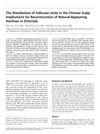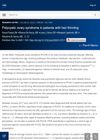An Updated Overview of Polycystic Ovary Syndrome
June 2019
in “
Innovare journal of medical sciences
”

TLDR Polycystic Ovary Syndrome (PCOS) is a hormonal disorder in women that can cause infertility and other health issues, and it may be improved by treatments that increase insulin sensitivity.
The 2019 document provided an overview of Polycystic Ovary Syndrome (PCOS), a hormonal disorder affecting 5-10% of women of reproductive age. PCOS is characterized by menstrual dysfunction, hyperandrogenism, obesity, acne, amenorrhea, irregular menstrual cycles, hirsutism, insulin resistance, and high cholesterol. It can lead to infertility due to ovulation issues. The disorder is believed to be a result of interactions between genetic and environmental factors, with obesity exacerbating the underlying genetic predisposition. The treatment for PCOS can involve lifestyle changes, synthetic medicine, and alternative medicine. The document also highlighted the role of insulin resistance in the pathogenesis of PCOS and suggested that interventions that improve insulin sensitivity may ameliorate hyperandrogenism in women with PCOS. The study involved 52 women and found that women with PCOS were more likely to report hirsutism, diabetes mellitus, hypertension, and previous coronary artery disease. The study also found that androgenic alopecia is common in women with PCOS, but requires a familial predisposition to baldness and an associated increase in circulating androgens. The document concluded by emphasizing the need for more research into the genetics and pathophysiology of PCOS to determine preventative risk factors and successful treatment modalities.





